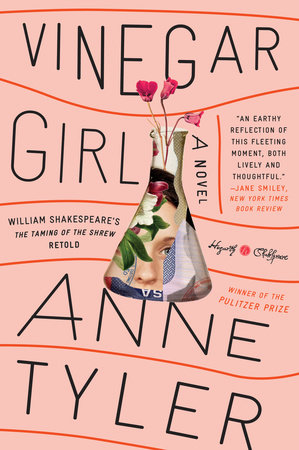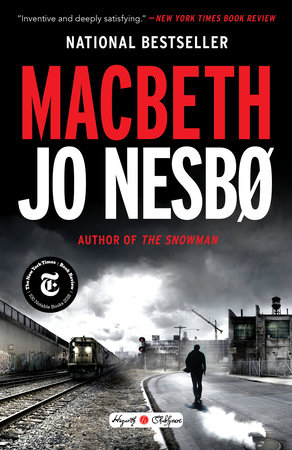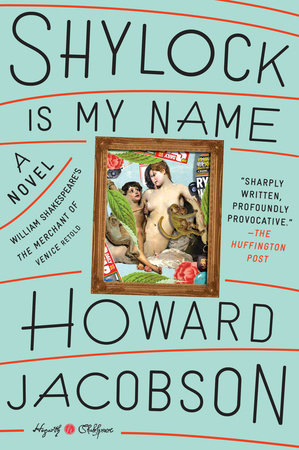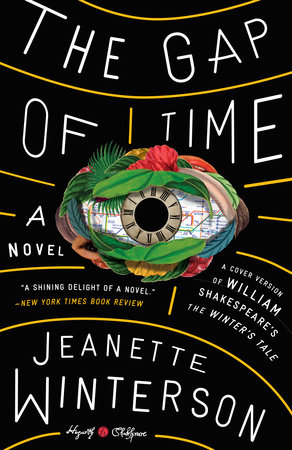Excerpt
Vinegar Girl
CHAPTER ONE
Kate Battista was gardening out back when she heard the telephone ring in the kitchen. She straightened up and listened. Her sister was in the house, although she might not be awake yet. But then there was another ring, and two more after that, and when she finally heard her sister’s voice it was only the announcement on the answering machine. “Hi-yee! It’s us? We’re not home, looks like? So leave a—”
By that time Kate was striding toward the back steps, tossing her hair off her shoulders with an exasperated “Tcch!” She wiped her hands on her jeans and yanked the screen door open. “Kate,” her father was saying, “pick up.”
She lifted the receiver. “What,” she said.
“I forgot my lunch.”
Her eyes went to the counter beside the fridge where, sure enough, his lunch sat precisely where she had set it the night before. She always used those clear plastic bags that supermarket produce came in, and the contents were plainly visible: a Tupperware sandwich box and an apple.
“Huh,” she said.
“Can you bring it?”
“Bring it now?”
“Right.”'
“Jesus, Father. I’m not the Pony Express,” she said.
“What else have you got to do?” he asked her.
“It’s Sunday! I’m weeding the hellebores.”
“Ah, Kate, don’t be like that. Just hop in the car and zip over; there’s a good girl.”
“Sheesh,” she said, and she slammed the receiver down and took the lunch bag from the counter.
There were several strange things about this conversation. The first was that it had happened at all; her father distrusted the telephone. In fact, his lab didn’t even have a telephone, so he must have called on his cell phone. And that was unusual too, because his only reason for owning a cell phone was that his daughters had insisted. He had gone into a brief flurry of app purchases when he first acquired it—scientific calculators of various types, for the most part—and after that had lost all interest, and avoided it now altogether.
Then there was the fact that he forgot his lunch about twice a week, but had never before seemed to notice. The man did not eat, basically. Kate would get home from work and find his lunch still sitting on the counter, and yet even so she would have to shout for him three or four times that evening before he would come to dinner. Always he had something better to do, some journal to read or notes to go over. He would probably starve to death if he were living alone.
And supposing he did feel a bit peckish, he could have just stepped out and bought something. His lab was near the Johns Hopkins campus, and there were sandwich shops and convenience stores everywhere you looked.
Not to mention that it wasn’t even noon yet.
But the day was sunny and breezy, if cool—the first semi-decent weather after a long, hard, bitter winter—and she didn’t actually mind an excuse to get out in the world. She wouldn’t take the car, though; she would walk. Let him wait. (He himself never took the car, unless he had some sort of equipment to ferry. He was something of a health fiend.)
She stepped out the front door, shutting it extra hard behind her because it irked her that Bunny was sleeping so late. The ground cover along the front walk had a twiggy, littered look, and she made a mental note to spruce it up after she finished with the hellebores.
Swinging the lunch bag by its twist-tied neck, she passed the Mintzes’ house and the Gordons’ house—stately brick center-hall Colonials like the Battistas’ own, although better maintained—and turned the corner. Mrs. Gordon was kneeling among her azalea bushes, spreading mulch around their roots. “Why, hello there, Kate!” she sang out.
“Hi.”
“Looks like spring might be thinking of coming!”
“Yup.”
Kate strode on without slowing, her buckskin jacket flying out behind her. A pair of young women—most likely Hopkins students—drifted at a snail’s pace ahead of her. “I could tell he wanted to ask me,” one was saying, “because he kept clearing his throat in that way they do, you know? But then not speaking.”
“I love when they’re so shy,” the other one said.
Kate veered around them and kept going.
At the next street she took a left, heading toward a more mixed-and-mingled neighborhood of apartments and small cafés and houses partitioned into offices, and eventually she turned in at yet another brick Colonial. This one had a smaller front yard than the Battistas’ but a larger, grander portico. Six or eight plaques beside the front door spelled out the names of various offbeat organizations and obscure little magazines. There was no plaque for Louis Battista, though. He had been shunted around to so many different buildings over the years, landing finally in this orphan location near the university but miles from the medical complex, that he’d probably decided it just wasn’t worth the effort.
In the foyer an array of mailboxes lined one wall, and sliding heaps of flyers and takeout menus covered the rickety bench beneath them. Kate walked past several offices, but only the Christians for Buddha door stood open. Inside she glimpsed a trio of women grouped around a desk where a fourth woman sat dabbing her eyes with a tissue. (Always something going on.) Kate opened another door at the far end of the hall and descended a flight of steep wooden stairs. At the bottom she paused to punch in the code: 1957, the date Witebsky first defined the criteria for autoimmune disorders.
The room she entered was tiny, furnished only by a card table and two metal folding chairs. A brown paper bag sat on the table; another lunch, it looked like. She set her father’s lunch next to it and then went over to a door and gave a couple of brisk knocks. After a moment, her father poked his head out—his satiny bald scalp bordered by a narrow band of black hair, his olive-skinned face punctuated by a black mustache and round-lensed, rimless spectacles. “Ah, Kate,” he said. “Come in.”
“No, thanks,” she said. She never could abide the smells of the place—the thin, stinging smell of the lab itself and the dry-paper smell of the mouse room. “Your lunch is on the table,” she said. “Bye.”
“No, wait!”
He turned from her to speak to someone in the room behind him. “Pyoder? Come out and say hello to my daughter.”
“I’ve got to go,” Kate said.
“I don’t think you’ve ever met my research assistant,” her father said.
“That’s okay.”
But the door opened wider, and a solid, muscular man with straight yellow hair stepped up to stand next to her father. His white lab coat was so dingy that it very nearly matched Dr. Battista’s pale-gray coveralls. “Vwouwv!” he said. Or that was what it sounded like, at least. He was gazing at Kate admiringly. Men often wore that look when they first saw her. It was due to a bunch of dead cells: her hair, which was blue-black and billowy and extended below her waist.
“This is Pyoder Cherbakov,” her father told her.
“Pyotr,” the man corrected him, allowing no space at all between the sharp-pointed t and the ruffly, rolling r. And “Shcherbakov,” explosively spitting out the mishmash of consonants.
Pyoder, meet Kate.”
“Hi,” Kate said. “See you later,” she told her father.
“I thought you might stay a moment.”
“What for?”
“Well, you’ll need to take back my sandwich box, will you not?”
“Well, you can bring it back yourself, can you not?”
A sudden hooting sound made both of them glance in Pyotr’s direction. “Just like the girls in my country,” he said, beaming. “So rude-spoken.”
“Just like the women,” Kate said reprovingly.
“Yes, they also. The grandmothers and the aunties.”
She gave up on him. “Father,” she said, “will you tell Bunny she has to stop leaving such a mess when she has her friends in? Did you see the TV room this morning?”
“Yes, yes,” her father said, but he was heading back into the lab as he spoke. He returned, pushing a high stool on wheels. He parked it next to the table. “Have a seat,” he told her.
“I need to get back to my gardening.”
“Please, Kate,” he said. “You never keep me company.”
She stared at him. “Keep you company?”
“Sit, sit,” he said, motioning toward the stool. “You can have part of my sandwich.”
“I’m not hungry,” she said. But she perched awkwardly on the stool, still staring at him.
“Pyoder, sit. You can share my sandwich too, if you want. Kate made it especially. Peanut butter honey on whole-wheat.”
“You know I do not eat peanut butter,” Pyotr told him severely. He pulled out one of the folding chairs and settled catty-corner to Kate. His chair was considerably lower than her stool, and she could see how the hair was starting to thin across the top of his head. “In my country, peanuts are pigs’ food.”
“Ha, ha,” Dr. Battista said. “He’s very humorous, isn’t he, Kate?”
“What?”
“They eat them with the shells on,” Pyotr said.
He had trouble with th sounds, Kate noticed. And his vowels didn’t seem to last long enough. She had no patience with foreign accents.
“Were you surprised that I used my cell phone?” her father asked her. He was still standing, for some reason. He pulled his phone from a pocket in his coveralls. “You girls were right; it comes in handy,” he said. “I’m going to start using it more often now.” He frowned down at it for a moment, as if he were trying to remember what it was. Then he punched a button and held it in front of his face. Squinting, he took several steps backward. There was a mechanical clicking sound. “See? It takes photographs,” he said.
“Erase it,” Kate ordered.
“I don’t know how,” he said, and the phone clicked again.
“Damn it, Father, sit down and eat. I need to get back to my gardening.”
“All right, all right.”
He tucked the phone away and sat down. Pyotr, meanwhile, was opening his lunch bag. He pulled out two eggs and then a banana and placed them on the flattened paper bag in front of him. “Pyoder believes in bananas,” Dr. Battista confided. “I keep telling him about apples, but does he listen?” He was opening his own lunch bag, taking out his apple. “Pectin! Pectin!” he told Pyotr, shaking the apple under Pyotr’s nose.
“Bananas are miracle food,” Pyotr said calmly, and he picked his up and started peeling it. He had a face that was almost hexagonal, Kate noticed—his cheekbones widening to two sharp points, the angles of his jaw two more points slanting to the point of his chin, and the long strands of his hair separating over his forehead to form the topmost point. “Also eggs,” he was saying. “The egg of the hen! So cleverly self-contained.”
“Kate makes my sandwich for me every single night before she goes to bed,” Dr. Battista said. “She’s very domestic.”
Kate blinked.
“Peanut butter, though,” Pyotr said.
“Well, yes.”
“Yes,” Pyotr said with a sigh. He sent her a look of regret. “But is certainly pretty enough.”
“You should see her sister.”
Kate said, “Oh! Father!”
“What?”
“This sister is where?” Pyotr asked.
“Well, Bunny is only fifteen. She’s still in high school.”
Okay,” Pyotr said. He returned his gaze to Kate.
Kate wheeled her stool back sharply and stood up. “Don’t forget your Tupperware,” she told her father.
"What! You’re leaving? Why so soon?”
But Kate just said, “Bye”—mostly addressing Pyotr, who was watching her with a measuring look—and she marched to the door and flung it open.
“Katherine, dearest, don’t rush off!” Her father stood up. “Oh, dear, this isn’t going well at all. It’s just that she’s so busy, Pyoder. I can never get her to sit down and take a little break. Did I tell you she runs our whole house? She’s very domestic. Oh, I already said that. And she has a full-time job besides. Did I tell you she teaches preschool? She’s wonderful with small children.”
“Why are you talking this way?” Kate demanded, turning on him. “What’s come over you? I hate small children; you know that.”
There was another hooting sound from Pyotr. He was grinning up at her. “Why you hate small children?” he asked her.
“Well, they’re not very bright, if you’ve noticed.”
He hooted again. What with his hooting and the banana he held, he reminded her of a chimpanzee. She spun away and stalked out, letting the door slam shut, and climbed the stairs two at a time.
Behind her, she heard the door open again. Her father called, “Kate?” She heard his steps on the stairs, but she strode on toward the front of the building.
His steps softened as he arrived on the carpet. “I’ll just see you out, why don’t I?” he called after her.
See her out?
But she paused when she reached the front door. She turned to watch him approach.
“I’ve handled things badly,” he said. He smoothed his scalp with one palm. His coveralls were one-size-fits-all and they ballooned in the middle, giving him the look of a Teletubby. “I didn’t mean to make you angry,” he said.
“I’m not angry; I’m . . .”
But she couldn’t say the word “hurt.” It might bring tears to her eyes. “I’m fed up,” she said instead.
“I don’t understand.”
She could believe that, actually. Face it: he was clueless.
clueless.“And what were you trying to do back there?” she asked him, setting her fists on her hips. “Why were you acting so . . . peculiar with that assistant?”
“He’s not ‘that assistant’; he’s Pyoder Cherbakov, whom I’m very lucky to have. Just look: he came in on a Sunday! He does that often. And he’s been with me nearly three years, by the way, so I would think you would at least be familiar with his name.”
“Three years? What happened to Ennis?”
“Good Lord! Ennis! Ennis was two assistants back.”
“Oh,” she said.
She didn’t know why he was acting so irritable. It wasn’t as if he ever talked about his assistants—or about anything, in fact.
“I seem to have a little trouble keeping them,” he said. “It may be that to outsiders, my project is not looking very promising.”
This wasn’t something he had admitted before, although from time to time Kate had wondered. It made her feel sorry for him, suddenly. She let her hands drop to her sides.
“I went to a great deal of effort to bring Pyoder to this country,” he said. “I don’t know if you realize. He was only twenty-five at the time, but everybody who’s anybody in autoimmunity had heard of him. He’s brilliant. He qualified for an O‑1 visa, and that’s not something you often see these days.”
“Well, good, Father.”
“An extraordinary-ability visa; that’s what an O‑1 is. It means that he possesses some extraordinary skill or knowledge that no one here in this country has, and that I am involved in some extraordinary research that justifies my needing him.”
“Good for you.”
“O‑1 visas last three years.”
She reached out to touch his forearm. “Of course you’re anxious about your project,” she said, in what she hoped was an encouraging tone. “But I bet things will be fine.”
“You really think so?” he asked.
She nodded and gave his arm a couple of clumsy pats, which he must not have been expecting because he looked startled. “I’m sure of it,” she told him. “Don’t forget to bring your sandwich box home.”
Then she opened the front door and walked out into the sunshine. Two of the Christians for Buddha women were sitting on the steps with their heads together. They were laughing so hard about something that it took them a moment to notice her, but then they drew apart to let her pass.










